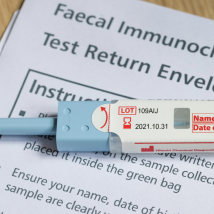Dr. Salman Waqar, Former President of the British Islamic Medical Association (BIMA), features in a new ARC East of England video, encouraging the use of culturally tailored approaches to increase cancer screening uptake within the Muslim community.
A new video for GPs and healthcare professionals encourages greater cultural understanding as a key approach to addressing the inequalities faced by Muslim communities in accessing vital cancer screenings, diagnoses and treatment. This video is a part of an ARC East of England project that evaluated the effectiveness of cultural interventions in increasing understanding and attendance of bowel cancer screenings.
Cancer screenings play a crucial role in early disease detection, prevention, and survival outcomes. Research estimates that cancer screenings save 10,000 lives in England every year. Inequalities in bowel cancer screening uptake are prevalent in deprived areas, where 40% of Muslims live. These communities are more likely to receive a late diagnosis, with uptake rates 28% lower in people of South Asian ethnicity compared to the general population.
Funded by the NHS England, The British Islamic Medical Association (BIMA), a national association of British Muslim healthcare professionals, developed and delivered a one-hour educational session in mosques in Peterborough and Luton. Healthcare professionals tailored the session to the Muslim culture and religion to see whether this approach made the information more accessible.
"Existing inequalities in cancer screening persist because services often fail to recognise the full spectrum of people’s lived experiences. It’s not just about ethnicity, culture, or language, healthcare must acknowledge faith, identity & trust as critical factors. True inclusion means moving beyond translation to innovative service design that addresses longstanding disparities and prioritises."
Dr. Salman Waqar, Former President of The British Islamic Medical Association
In the video, Dr. Salman Waqar, GP and Former President of BIMA, highlights the importance of incorporating culturally tailored approaches as a way of responding to and engaging with the needs of Muslim communities. This includes faith leaders having an active role in discussing the importance of screenings and overcoming potential taboo topics, using familiar settings such as mosques to encourage individuals to attend screenings, and discussing faith throughout the cancer journey to promote person-centred care.
“Meeting the needs of the Muslim community in cancer screening and care is paramount and working collaboratively with the British Islamic Medical Association was a first important step in helping to inform NHS Cancer Services. Working at grassroots level is key to developing trust and enhancing community engagement.”
Professor Daksha Trivedi, Principal Investigator of the Evaluation of the BIMA Study
Professor Daksha Trivedi, Researcher at the University of Hertfordshire, and Dr. Claire Thompson, Theme Lead of the ARC East of England Prevention and Early Detection in Health and Social Care theme (University of Hertfordshire), led the evaluation of the cultural intervention. Preliminary findings suggest that culturally tailored approaches can help in increasing the uptake of bowel cancer screenings in comparison to traditional cancer screening campaigns. The study will soon release the final paper.
With NHS England now rolling out at-home bowel cancer tests for individuals over 50, increasing awareness about the importance of bowel cancer screenings is more urgent than ever. The BIMA project hopes to conduct a larger-scale study to explore the acceptability and feasibility of culturally tailored interventions.
If you are a healthcare professional that wants to learn more about cultural approaches, then contact BIMA directly who can provide advice and resources. To hear more about this project, then contact Emilia Tylenda, e.tylenda@herts.ac.uk.
Watch the video here:
The British Islamic Medical Association (BIMA) is a leading organisation representing Muslim healthcare professionals in the UK. BIMA is committed to promoting health and wellbeing within Muslim communities and advocating for equitable healthcare access for all. Find out more about BIMA here.
